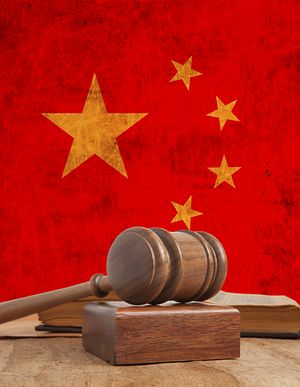On October 23, 2014, at the fourth plenum of the 18th National Party Congress, the Chinese Communist Party issued a communique on “comprehensively advancing ruling the country according to the law.” In the months since, “rule of law” (法治, often translated by skeptical analysts as “rule by law”) has been a point of emphasis for Chinese leaders, along with combating corruption and rebalancing China’s economy. Speaking at the plenum, Xi reportedly called the rule of the country according to the law “fundamental.” “We must stick to it in the long term,” Xi said.
Yet even while extolling the importance of the “rule of law,” Chinese authorities have been targeting those tasked with practicing the law. Over the past month, China has undertaken an unprecedented crackdown on its lawyers, particularly those who focus on human rights cases. According to Reuters, nearly 250 people have been taken into custody since the crackdown began. As has become common, Chinese state broadcasters aired videos of some of the accused confessing to their alleged crimes and denouncing their colleagues. Most notably, lawyer Huang Liqun accused his former colleague of sexual assault and embezzlement.
How is China reconciling its wide-ranging attack on lawyers with its push to cement the “rule of law”? Unsurprisingly, to Chinese authorities (and the state media they control), there is no contradiction at all. Xinhua has run a number of articles arguing that those detained are criminals and deserve no sympathy. Many of the lawyers stand accused of “disrupting public order” (a catch-all charge that includes various types of demonstrations).
Chinese media says the lawyers hired protestors and organized mass events in the hope of influencing court decisions. According to this logic, China’s crackdown on lawyers is in fact a defense of China’s legal system. “In China, lawyers who use illegal means to defend the rights of their clients are no longer lawyers,” one Xinhua piece argued. “Lawless lawyers… treat trials as performance, as a stage on which to make the public believe judges are not qualified and to encourage the public to pressurize courts.” Another Xinhua piece called the accused “but phonies who seek personal fame and economic gain.”
The problem of lawyers seeking to circumvent the law by swaying public opinion is worthy of consideration. . In China, it’s not uncommon for lawyers to seek to sway public opinion to their side, in the hopes of winning more consideration from judges. Lawyers have used social media to drum up interest in cases and sympathy for clients. In one notable case from 2012, a death sentence against a Chinese entrepreneur convicted of fraud was overturned after a massive public outcry. At the time, He Bing, vice dean of the law school at the China University of Political Science and Law, argued that “the Internet provides a convenient venue for public supervision of justice.”
Yet at the same time, using manipulation of public opinion to sway cases is a dangerous game – in 2011, a young man was executed, to immense public satisfaction, after stabbing a woman he had hit with his car. Some feared that the sentence had only been passed down to mollify a public tired of seeing the wealthy avoid punishment.
Yes, the problem is a serious one. Still, it seems odd that the only lawyers guilty of such behavior are – conveniently enough – the ones that seek to advance the cause of human rights defense in China. The other charge laid against the lawyers makes clear the real reason for the arrests – not that they subverted the law, but that they sought to undermine the Party in the eyes of the people.
Xi Jinping has not tried to hide the fact that, in China’s version of the “rule of law,” the Party still remains above the law, as it always has. In an April speech, he dismissed this contradiction as “a tricky political pitfall.” Xi seems genuine in his wish for a more reliable legal system, especially if it wins more public trust in China’s courts as a means of resolving grievances. But whatever reforms may come, the legal system remains a tool for the Party to use to protect itself first and foremost.
That means those who seek to use the law (or China’s constitution, for that matter) to push back against Party or government excesses have the deck stacked against them. Defense lawyers for politically-targeted prisoners are routinely denied access to their clients–ironically, the lawyers arrested in this crackdown have also reportedly been denied access to their own defense lawyers. This is in spite of recently passed Chinese laws that supposedly require all lawyers to be given access to their clients. All people are equal before the law – but some are more equal than others under China’s version of the “rule of law.”
As a Xinhua defense of the crackdown on lawyers noted, “China has written ‘effective respect and protection of human rights’ together with ‘implementation of rule-of-law,’ ‘law-respecting government’ and ‘higher judicial credibility’ into its targets to be hit by 2020.” Unfortunately, most of the those goals will be difficult – if not impossible – to achieve so long as the Party continues to place itself above the law. And so those who champion “effective respect and protection of human rights” through the “implementation of rule-of-law” are being jailed en masse in Xi’s China, despite the apparent synergy between their goals and the Party’s stated aims.
By going after the rights lawyers, Chinese authorities are proving how circumscribed their definition of “rule of law” truly is. They are also verging on the ridiculous, arguing that these lawyers – who are hamstrung from performing their legal duties in every conceivable way – are somehow jeopardizing the state’s control of the legal system. As Chinese journalist and activist Zhai Mingle put it, “It’s as if two people sat down to play chess and one of them knocked over the chessboard and then blamed his opponent for being a ruffian.”
































